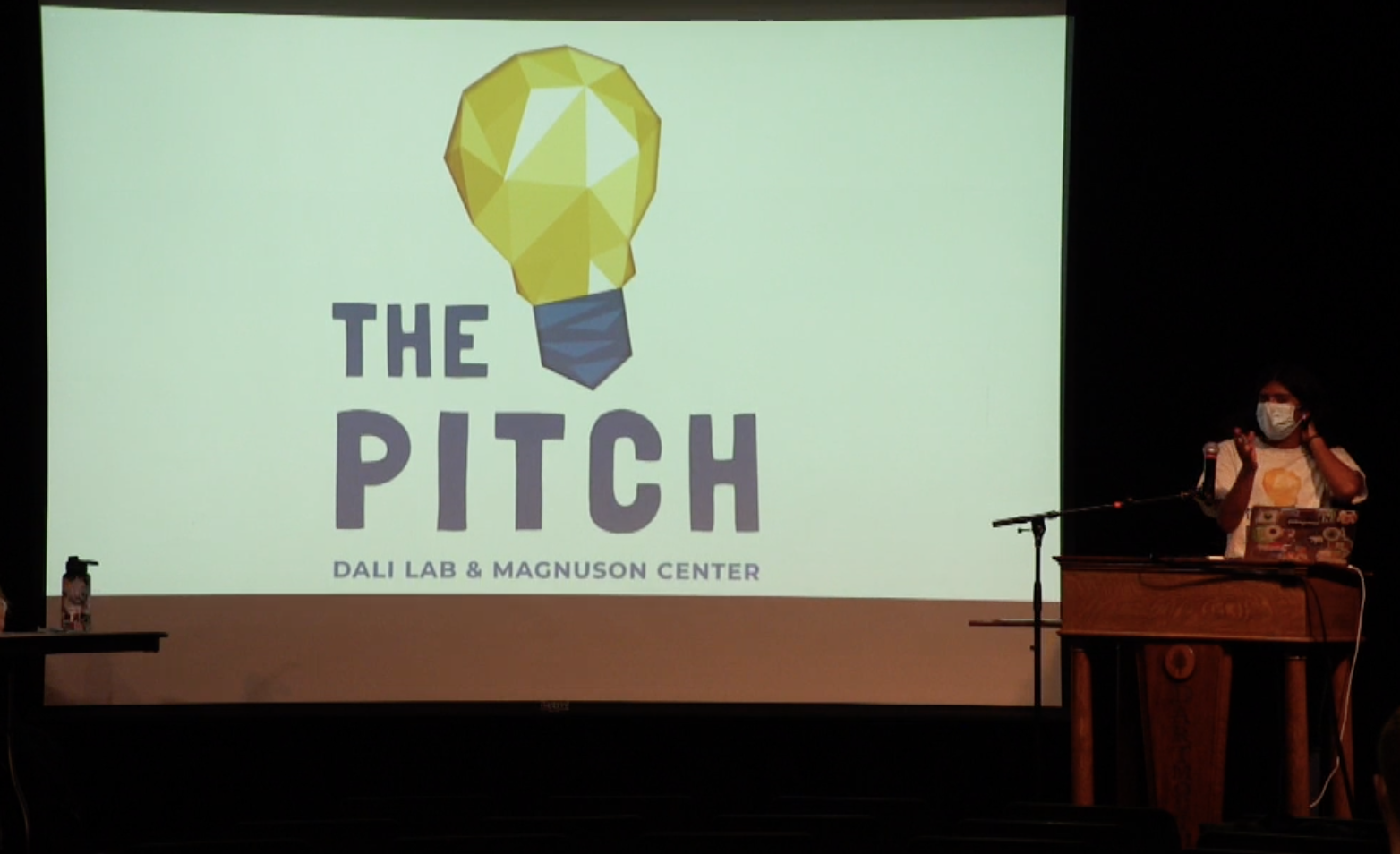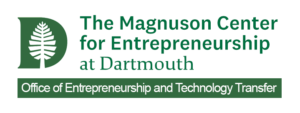12 Student Startups Compete At The Pitch
Twelve student-run startups competed for funding and guidance at The Pitch, an event sponsored by the Magnuson Center for Entrepreneurship and DALI Lab.

Twelve teams of student founders entered The Pitch competition recently with unique ideas about how to change the world. From a platform to make politics on social media less toxic, to an app that makes translation more equitable, the endeavors aimed to solve problems for people around the globe.
The teams took turns presenting to audience members and a panel of judges from the Magnuson Center and DALI Lab.
The Startup Prize, awarded with $1,000 and the promise of support from the Magnuson Center, went to Future Farmers. The platform will provide a two-sided marketplace, pairing farmers and retailers. The founders aim to make agriculture more profitable for Eastern European farmers, beginning in the country of Georgia. Rather than farmers paying up to 40% of their profits to middlemen, the Future Farmers platform allows them to sell their wares to retailers in a more efficient and profitable way. This results in a 20% increase in profits for farmers, a 10% savings for retailers, and 10% fee to the platform.
The Build Prize, which comes with one semester of development in DALI Lab, was awarded to TonePhoria. The platform, started by trans student Kala Goyel, aims to revolutionize voice training. Goyel pointed out that voice training — unlearning certain gendered vocal habits and establishing others — can help fight gender dysphoria while also keeping trans people safer.
“Being able to go about your life without strangers realizing that you’re trans can increase safety,” she said.
The app provides pitch, resonance and intonation feedback, utilizing a pay-what-you-can model to make it available in an equitable way.
The Best Pitch Prize, chosen by audience votes, went to InStalled Solutions. The venture aims to promote menstrual cup use by providing washing devices in public restrooms. Best practice is to wash a menstrual cup each time it is emptied, but that’s not often possible in public restrooms with stalls. That barrier can deter people like college students from using menstrual cups, the team said.
The InStalled device hangs on the wall and is activated by a foot pedal, providing a discreet, safe and sanitary way for people to change their cup in public. By breaking down barriers to menstrual cup use, the team aims to promote cups as an affordable, sustainable and comfortable solution to period care.
Here are the other nine teams that participated in The Pitch
The East Africa Project
The East Africa Project uses publicly-available satellite data to direct responses to humanitarian crises. The initiative builds on the work of the Satellite Sentinel Project, which manually reviews satellite images in war-affected areas to determine where a crisis like a fire has taken place. The East Africa Project automates the process, making it more effective and ultimately improving response times.
MentalPal
MentalPal aims to provide stigma-free access to high-quality mental health care to Zambians. Founder Michael Moyo D’22 plans to use his first-hand knowledge of the country to overcome unique barriers in the Zambian marketplace — like having a multilingual society — in order to connect patients and providers, making MentalPal “the Uber of mental health.”
Polis
Politics on social media has become toxic. Existing social platforms are polarizing, and often distract from policy issues. Polis will be a policy-focused social media platform for government officials and civilians to share reputable news and policy items.
Boombox
The founders of Boombox believe the soundtrack of your life is meant to be shared. That’s why they’ve developed the “Instagram of music.” The app has a social feed where users can share songs, playlists and artists that they are enjoying. The app draws from a user’s Apple Music or Spotify lists, amplifying the number of plays and thus providing a financial benefit to artists as well.
Macaw Translate
Although we live in a multilingual world, existing translation solutions are culturally irrelevant, complex and expensive. That can have tragic results, when someone cannot get accurate and accessible translation in a medical setting. Macaw Translate aims to democratize translation, pairing users and translators for text, video or audio conversations.
ChemScribble
Organic chemistry is a massive barrier standing between many pre-med students and their career goals. While the class is hard, preparing lab reports with existing ChemDraw software is frustrating and time consuming for more than 80% of Dartmouth students surveyed. ChemScribble is a platform that makes drawing and preparing reports easier.
Songchain
Booking an event can be tedious and unpredictable for performers and organizers. Songchain connects musicians, comedians and other performers with the people who want to book them. The platform will charge roughly a 5% premium for ease of booking and payment protections, providing a potential profit margin.
Senti
Private equity firms have few objective measurements to evaluate the public perception of companies that they invested in. Senti, scrapes thousands of consumer reviews, using a language processing algorithm to provide a visual representation of a company’s strong and weak points, in order to boost performance.
Sizeable
Purchasing baby clothing, only to have it outgrown in a matter of weeks, is expensive, wasteful and time-consuming. Enter, Sizeable, a clothing rental subscription service for parents of babies. The company sources clothes in the off-season, sending rented packages to parents of infants. When the items are outgrown they’re either purchased or returned, and a new wardrobe from Sizable is sent out.

